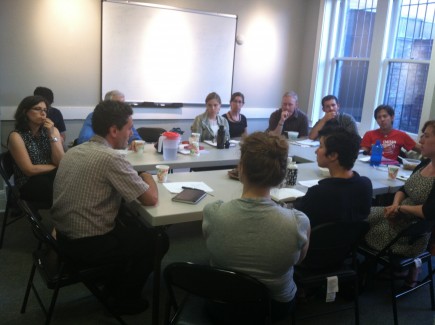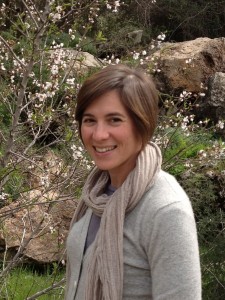This article originally appeared on The Jewish Week, and profiles Seminary Leadership Project Alum Elana Rosen-Brown.
Rabbis for Human Rights launches summer social-justice fellowship for diverse group of seminarians.
Helen Chernikoff, Staff Writer
Knocking on strangers’ doors is never easy. That’s especially true when the knocker, a young cantor, finds her Hebrew getting tangled up with her Spanish. Which in turn makes it harder to persuade public housing residents — already weary of theft in their hallways and police at their peepholes — to open up.
But that’s exactly how Elana Rosen-Brown, 30, an ordained cantor and rabbinical student in the combined program at New York’s Hebrew Union College – Jewish Institute of Religion, wanted to spend this steamy summer. She got her wish when she won a spot in Rabbis for Human Rights-North America’s first class of rabbinical and cantorial fellows.
The new program signals the increasing importance of Jewish activism — long a phenomenon of the foundation and nonprofit sector — in congregational life.
“These issues of poverty affect us all … I want to learn how to act in solidarity as a Jewish community with other organizations outside the walls of the synagogue,” said Rosen-Brown, who is working an a East Harlem community organizing group, Community Voices Heard. She also said she wanted to learn how to apply to a synagogue the techniques and structure of the East Harlem community organizing group she’s working at, Community Voices Heard, where the leaders are also the members.
Rosen-Brown is not only immersing herself in New York City government policies like “participatory budgeting,” in which residents vote on proposed public projects, but she’s also learning from veteran activist Carmen Pineiro how to talk about those policies with the low-income population that CVH serves.
Last Monday morning, Rosen-Brown was doing her best to emulate Pineiro’s direct, no-nonsense delivery inside a housing project whose halls, redolent of old garlic and roach spray, also bore evidence, according to Pineiro, of illegal activity (in the overhead cable conduits that had been split open to store drugs).
Rosen-Brown’s “shpiel” — Pineiro’s word — got shorter and stronger as she went, earnestly angling her face and right foot into however many slim inches of space she was granted between door and frame.
At the end of the morning’s outreach efforts, Rosen-Brown and Pineiro had talked to several residents about participatory budgeting. A voice floated out from deep inside one of the small apartments: “Fight the power!” Out in the hall, Rosen-Brown pumped her fist.
The widespread tendency of American Jews to identify Judaism itself with activism has been well documented, and over the last 15 years has supported an expanding social justice sector including veterans like international aid organization American Jewish World Service and newcomers like Challah for Hunger.
This consensus is not without its cracks, however.
Political conservatives don’t like Jewish social justice groups’ generally liberal solutions to problems; religious conservatives object that it tends to not see rabbinic law as obligatory, said Jonathan Neumann, a 24-year-old Tikvah Fellow from London who is researching the history and modern usage of the concept of “tikkun olam,” or “repairing the world,” and hopes to write a book about it.
Today’s seminary students came of age in this environment and had access to Jewish social justice programs in high school and college. More of them than ever before are determined to create activist pulpits and know they will find congregants who share their values.
“There are so many students who are trying to figure out how to integrate these issues into their rabbinate, and there aren’t many training opportunities,” said Rabbi Jill Jacobs, the executive director of RHR-NA, a partner, founded in 2002, of the original Israeli group.
Of the rabbinical schools at HUC-JIR, the Conservative movement’s Jewish Theological Seminary and the Orthodox Yeshiva University, only the Reform movement offers a for-credit course bearing directly on social justice, called “Leadership and Social Responsibility,” although students at all three seminaries have access to social justice work through internships.
At RHR-NA, Rosen-Brown and the other fellows spend three days of their week at their internships and the other two at the organization’s Chelsea offices. There, they study: Talmudic texts, for example, that address the sale of human beings and the redemption of captives are paired with a talk from an expert on human trafficking. They also learn from clergy already in the field; reflect on their experiences with a psychologist and begin the work of transmitting their new knowledge by writing sermons with future congregants in mind.
“The text studies we’ve been doing here have been consistently revelatory,” said Michael Langer, 27, a student at YU’s Rabbi Isaac Elchanan Theological Seminary who is working this summer at the Women’s Prison Association, which serves women with criminal justice histories.
About 16 students from all of American Judaism’s denominations vied for the four slots available in the fellowship’s pilot year, Rabbi Jacobs said. Funding permitting, Rabbi Jacobs plans to double the program’s size next year.
“I was worried that doing this work would make it impossible for me to do my pastoral work, but seeing a congregational leader who has very successfully interlaced the two was very inspiring,” said Adam Zagoria-Moffet, 23, of JTS.
The fourth fellow, Seth Wax, 31, is a student at non-denominational Hebrew College in Newton, Mass.
Social justice training for clergy may still be in short supply, but when Rabbi Jacobs was in rabbinical school at JTS in the late 1990s, there was hardly any available at all.
Back then, Rabbi Jacobs has written, everyone “humored her” when she said she wanted to devote her rabbinate to social justice. If you want to do that, they said, then why be a rabbi?
It was around that time, when most Jewish social justice groups were eking out an existence on the margins of the community, that the Nathan Cummings Foundationmade a conscious decision to help build the social justice movement in the hope that it would help revitalize American Judaism. The foundation seeded new organizations, funded established ones and created the Jewish Social Justice Roundtable, said Rabbi Jennie Rosenn, its program director for Jewish Life and Values.
Other funders joined in as Jewish leaders and laypeople, primed by the success of such organizations as City Year and Teach for America, spread the movement, Rabbi Rosenn said.
The Reform movement founded its congregation-based organizing arm, “Just Congregations,” in 2006. Uri L’Tzedek, a prominent Orthodox social justice organization, was created in 2007. AJWS takes a rabbinical student delegation to work with its partners in developing countries.
And in May, community organizing training group JOIN for Justice hosted what it called the first Jewish summit on the subject, offering a “clergy track” attended by both leaders of the Conservative Movement’s Rabbinical Assembly and a group that called itself the “Orthodox caucus.”
“It’s great that people find their way to human rights through their own personal stories, but there must be a way to be a bit more proactive instead of waiting for everyone to go through their own journey without support,” Rabbi Jacobs said.




 Aliza Kline is the Founding Executive Director of Mayyim Hayyim, and a member of the JOIN for Justice Board of Directors. At JOIN, we consider mentorship to be one of the essential aspects of leadership development, which is reflected in the structure of our legacy programs, the Jewish Organizing Fellowship and the Seminary Leadership Project. Aliza has developed a long standing internship program at Mayyim Hayyim. We asked for her reflections on what it means to be a mentor and how she has incorporated mentorship in her work at Mayyim Hayyim, developing Jewish community leaders.
Aliza Kline is the Founding Executive Director of Mayyim Hayyim, and a member of the JOIN for Justice Board of Directors. At JOIN, we consider mentorship to be one of the essential aspects of leadership development, which is reflected in the structure of our legacy programs, the Jewish Organizing Fellowship and the Seminary Leadership Project. Aliza has developed a long standing internship program at Mayyim Hayyim. We asked for her reflections on what it means to be a mentor and how she has incorporated mentorship in her work at Mayyim Hayyim, developing Jewish community leaders. 


